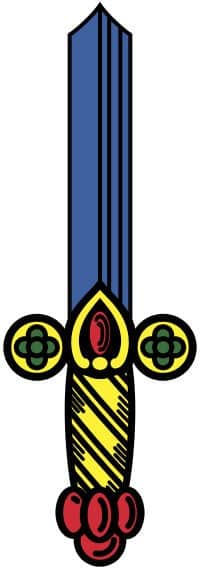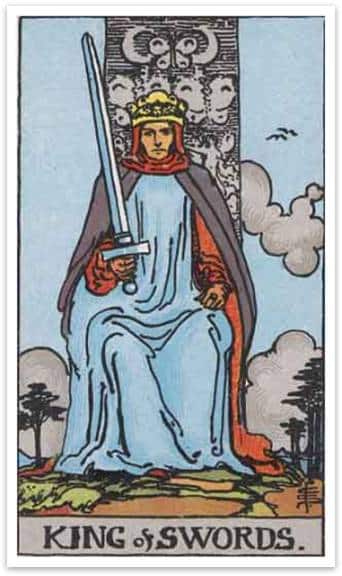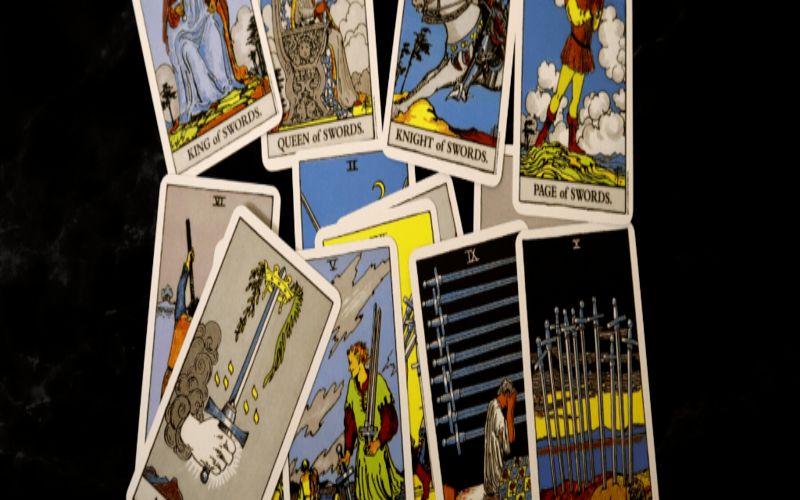The Swords are one of four suits in the Minor Arcana, the other suits are the Pentacles, Wands and Cups. Where the Major Arcana are a collection of 22 individual cards, the four Minor Arcana suits are different. Each suit contains 14 cards that depict a specific focus or energy for the decisions that we make in our everyday lives. The story of the Swords is one of finding your purpose and taking intentional action.
For many tarot beginners, the imagery on Sword cards can be very intense. The well-known tarot deck illustrations by Pamela Colman Smith, for example, show pierced bodies and blindfolded figures trapped between blades.
As we’ll see, this suit does sometimes suggest burden and loss. However, its appearance in your reading generally indicates that your current choices are helping you understand and demonstrate your values. When you fight for what you believe in, it’s true that you make sacrifices—but you also have the satisfaction of living authentically.
General Associations with Swords
What do you think of when you imagine swords? One of the best ways to build confidence by reading the Sword cards is to list your personal associations with the imagery they give you. Do you first think of a sword as a helpful tool? What about as a symbol of status or a weapon?
If you’re new to tarot or want to refresh your relationship to the Swords, I recommend exploring the suit without an external guide before you read the list of traditional associations below. Your own responses can guide your intuition as you interpret the connections between cards in your readings.
The Swords might have any of the following meanings:
- The Greek classical element of air, which is associated with the human soul
- The astrological air signs Gemini, Libra, and Aquarius
- The character traits of intelligence, knowledge, and power
- Situations involving ideas, communication, and conflict
- Active energy
- The season of autumn
- The full moon phase
- Action happening within weeks
- The direction of east
Rely on your instincts as a tarot reader, other cards in the spread, and the card placements to determine which meanings make the most sense.
Brief History of the Suit of Swords

The Swords of the tarot originated as the suit of spades in the French playing card decks of the 15th century. Spades, and later Swords, were associated with the nobility of the European feudal system. This social class included knights.
The historical foundation for the suit can help us understand a little more about how their contemporary meaning came to be. In the medieval period, society was organized around the concept of noble war, and knights demonstrated their honor by fighting wars for lofty beliefs and ideas.
Perhaps this is why some of Sword symbolism mixes the concepts of intelligence and purpose with the violent imagery of war: when the cards originated, cultural disagreements about beliefs were handled through armed warfare.
Positive Aspects of Swords
The Swords ask us to apply our logic, wisdom, and core values to make decisions in a situation. In the best cases, Swords represent clarity and justice. We know what we believe is right, and we know how to advocate for the highest good for ourselves and our communities.
When a Sword represents a person, that person’s character might be defined by the positive attributes of curiosity, dedication, balance, and fairness.
Negative Aspects of Swords
Like actual blades, Sword cards can be double-edged, even more than the other tarot suits. Situations that require Swords energy—a cool head and quick mind—often also involve tension, loss, or injustice.
A person whose character reflects the negative aspects of the Swords might hoard power or act cruelly. The shadow edge of this suit could also disrupt clarity and create anxiety and confusion instead.
Meaning of Swords in a Reading
When many Swords appear in a reading, you’re clarifying your ideas, engaging in a conflict, or carefully considering multiple perspectives to solve a problem. You might also be processing the outcomes of arguments or hard decisions.
In Love Readings
In readings about love relationships, Swords often indicate attraction to another’s mind. Because Swords represent communication, this suit in a love reading also illustrates a relationship phase that requires sharing openly or setting boundaries. The focus on communication could be a core strength of the relationship or an indication of a period of strife, which often demands a lot of talking.
In Work Readings
In readings about work, Swords can mean there are disagreements about how to complete a project. There might also be a misalignment between the work and someone’s inner values. Stress could be high, and the querent (a term for the person seeking clarity from the tarot) could feel lost and distressed. Reliance on the positive aspects of the Swords, such as logic and fairness, can help resolve workplace issues.
To get you started with some simpler readings check out our guide with examples for 10 easy three card spreads.
Journey of the Swords

The ten “pip cards” in each suit of the Minor Arcana tell a story that’s unique to the energy of the suit. With the suit of Swords, that narrative is about a quest to achieve something important. Often these quests involve core beliefs or moral standards. For instance, the querent might even be answering a spiritual calling or seeking change for the greater good.
If you have a deck with you now, find the Sword cards from the ace through ten. Arrange them in numerical order, and study the images. First, pretend you’re interpreting the cards as a story. If it helps, you can be very general; for example, you might interpret the Ace of Swords as a person setting a goal, but you don’t need to define what the goal is. Then, try to think of a specific story, such as the plot of a book or one of your own experiences, that you could tell using the Sword pip cards.
By practicing storytelling, you can better understand the full energy of the Swords and the types of experiences related to them. Refer to the general meanings of the cards below as you become more comfortable with them and their story.
Guide to start understanding the Swords
| Card | Keywords | Story Meaning: Example |
| Ace | Ideal, purpose, motivation | You realize that the type of work you’re doing at a big corporation doesn’t motivate you. |
| Two | Decision, impasse | You consider whether to stay at the job or leave the job. |
| Three | Loss, grief | By choosing to stay at a job that isn’t satisfying, you’re disappointed daily by the life you’ve chosen. |
| Four | Rest, strategy | Instead of making an immediate change, you decide to take a short vacation to rest and clear your mind. |
| Five | Conflict, consequences | When you return to work, you argue for an exciting project idea that your manager rejects. |
| Six | Sacrifice, departure | Even though the job pays well and offers security, you decide to quit to seek something more aligned with your values. |
| Seven | Resourcefulness, power balance | You try working as an independent consultant so that you have more control over your projects. |
| Eight | Entrapment, self-limitation | You start to feel pressure to take on too many jobs to pay the bills. |
| Nine | Anxiety, mental struggle | You worry that you don’t have the skills to succeed, especially because you didn’t feel appreciated at your previous job. |
| Ten | Finality, closure, exhaustion | Either you change your approach to your new work because of your anxiety, or you resolve the fears that lingered after your experience at the unsatisfying job. |
Court Cards of Swords
When Sword court cards appear in readings, they often represent people whose astrological signs are Gemini, Libra, or Aquarius. If not air signs, these people might instead have air-related personality traits, such as intelligence or wit. A court card can also represent you!
Review the descriptions of the four court cards below to learn more about who they often depict and who has Swords energy in your life.
Page of Swords
This Page is a youthful person, often a young woman or a femme person. Their energy is ambitious and resourceful, and they can use their strong communication skills to learn or to argue. Pages also represent the receipt of news; the Page of Swords represents news about public goals or projects.
Knight of Swords
The Knight is a relatively young person who might be a man. The energy here is swift, focused, and principled. However, it can also become too opinionated, aggressive, or domineering. Knights often make major changes rather quickly.
Queen of Swords
The Queen is a mature person who could be a woman. If not you, the Queen of Swords could be someone older than you or a mentor. This Queen knows herself well. She’s extremely intelligent and makes decisions with confidence—imagine a high-powered female executive or CEO.
King of Swords
The King is a mature person who’s likely a man. This King is a wise leader with a deeply analytical mind. In the best form, these Kings respect social order that serves justice, and they have the influence to preserve that order or make needed changes. Imagine a respected political figure, teacher, or judge.
Questions of the Swords

The questions that the cards pose might be particularly hard to answer. They often require thoughtful analysis and result in disruptive action. However, pondering these questions helps us determine how to move forward with confidence in our decisions, whatever the short-term consequences. This is the gift of the Swords.
When Swords appear in your reading, consider journaling about or meditating on the following questions:
- What do I value most?
- What’s my greatest goal?
- Why does this decision matter to me?
- Which factors am I willing to compromise?
- What am I not willing to sacrifice?
- What’s fair or morally right?
- How do I have control in this situation?
Most importantly maybe, spend time with the Suit of Swords and get to know them, let them speak and learn how they communicate with you.
Learn the Tarot with Online Flash Cards
Are you looking to dive into the world of tarot and master the meaning of each card? You should check out our post, “Learn The Tarot Cards – Online Flash Cards” by our own Tarot expert Ersa Fay. With interactive flash cards covering all 78 cards in the tarot, both the Minor and Major Arcana, you will learn key facts and the symbolism and meanings associated with each card.
By using these flash cards, you’ll become more comfortable with performing your own readings and enhance your journey into the world of tarot.
In the post, Ersa focuses on the iconic Rider-Waite-Smith tarot deck, known for its rich imagery and profound symbolism. The captivating illustrations in this deck draw from various sources such as mythology, astrology, alchemy, and the Kabbalah, creating a visual language that resonates deeply with the human psyche. So, if you’re ready to start learning, don’t miss out on this fantastic resource. We hope you find it useful and remember to have fun with it!
Featured Image Credit: Number5555, CC BY-SA 4.0, via Wikimedia Commons

